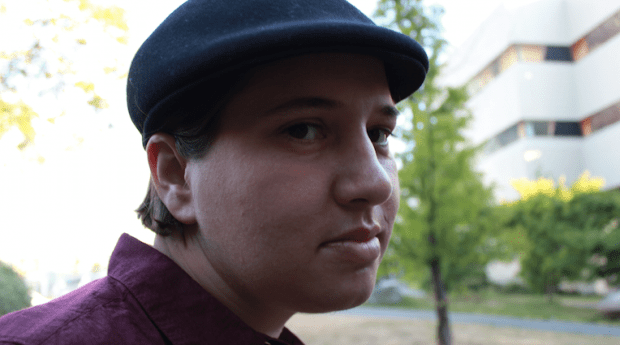What if a poem started off as prose, then disappeared on you? In Alex Leslie’s new collection, The Things I Heard About You, poems do many unexpected things — sometimes they distill, sometimes propagate, other times reconfigure and reinvent themselves. Each starts by being a longer unit, some almost short stories, then proceeds to transform into a shorter version, followed by an even smaller one, to finally end up as just one to a few words.
“I read this line from John Thompson’s Stilt Jack, ‘I know how small a poem could be,’ and I thought of calling this project ‘I know how small a story can be,’” Leslie explains, on how the “blacking out” method came about. “I was really interested in the idea of getting to the essence of the story. I started by reducing the scenes to try to get at the core of the meaning, and I found out that some of the pieces change their meaning as you progress through the sections, and for some others that doesn’t happen.”
Certain poems end up focusing on a person, others on a feeling or a place. “It was really an intuitive process and pretty unpredictable,” Leslie says. “I would only sometimes go back and edit for sound and tone.” To a number of poems in the collection, the reader can easily give a narrative, but others are more intangible. This allows for plenty of freedom in reading. “A writer I know told me that she actually read the book by reading each of the smallest pieces one after another and said it read like an autobiography of a childhood. I’ve heard from other readers, too, about the different ways they’ve read the book.”
Leslie’s first experience with blackout poetry was actually very practical and political. During the 2010 Vancouver Olympics, Leslie joined the poet Elizabeth Bachinsky for a participatory art event that invited members of the public to use news articles to create their own blackout poems. “It was a comment on censorship during the Olympics,” Leslie says. A collective of people would gather of an evening in an art space called the Candahar and create erasure poems out of photocopied news articles.
Is it fair to say that by its atmosphere The Things I Heard About You is a very BC, very Vancouver book? “I’d say it’s a piece that explores being tied to a certain landscape or a place — and how an identity is tied to a place. But there is definite connection to the coast.”
Leslie’s next project is a collection of short stories. “I think I have a strong interest in reproducing really specific details of life and in focusing on one character or place and kind of doing a thick description of that place. Short story is a form that works very well poetically. Its structure allows you to create an intense sense of a moment. Novels are different; they take the reader through a longer process.”
Asked to name writers of import and inspiration, Leslie cites Dionne Brand (“I totally love Brand’s Land to Light On”), Karen Solie, Julio Cortázar (“especially We Love Glenda So Much and Other Tales”) and native-American novelist Linda Hogan. “And last year I read this amazing anthology Troubling the Line, a collection of trans and genderqueer poetry published by Nightboat. I would really recommend everybody gave it a read.”
Alex Leslie poetry readings:
Twisted Poets reading series, with Heather Haley
Thurs, Jan 29, 7pm
Cottage Bistro, 4470 Main St, Vancouver
With Roy Miki at SFU Harbour Centre
Wed, Feb 18, noon
Teck Gallery, 515 W Hastings St, Vancouver

 Why you can trust Xtra
Why you can trust Xtra


